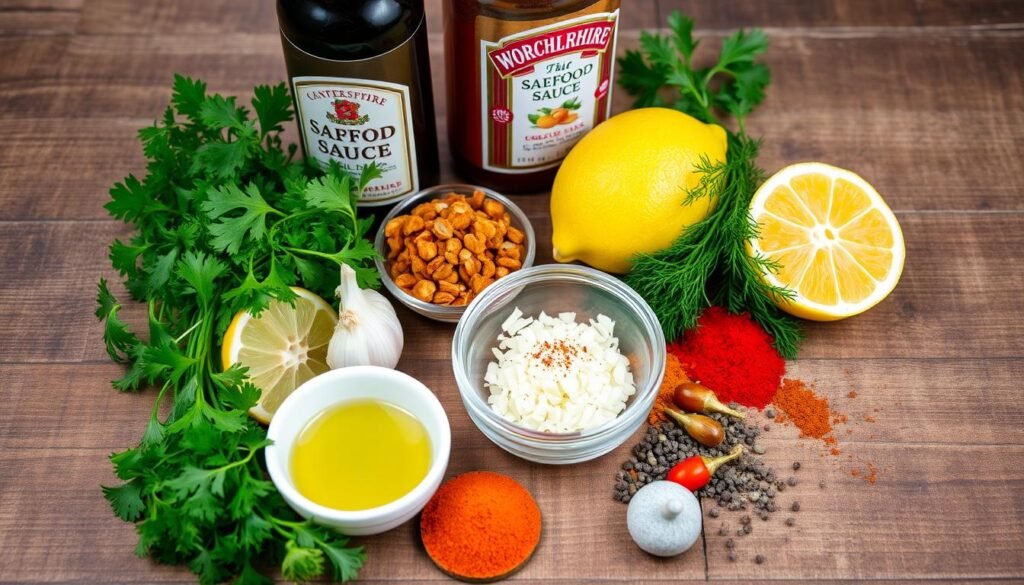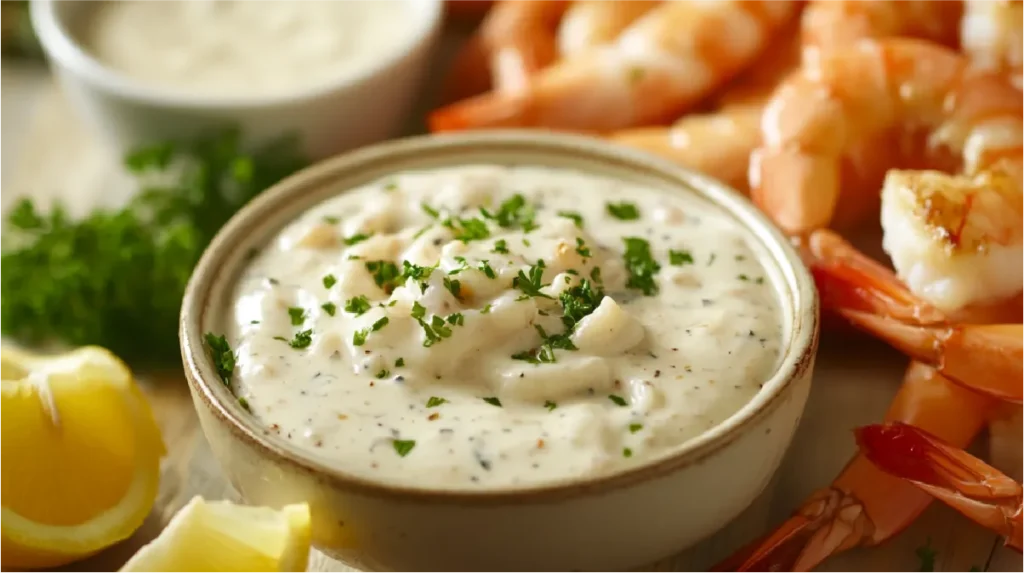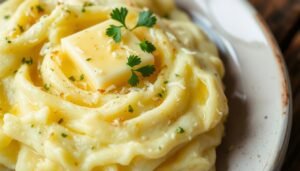I love cooking at home and exploring seafood flavors. Shrimp, crab, and halibut each have their own special taste. The proper sauce can make these flavors shine.
This guide will show you how to make fantastic seafood sauces. You’ll learn about key ingredients, techniques, and tools. We’ll cover everything from garlic butter to spicy Cajun sauces. You’ll be able to make your seafood dishes stand out.
Let’s start our journey to making the perfect seafood sauce. Every bite will be a taste of the ocean’s wonders.
Understanding the Basics of Seafood Sauces
Making the perfect seafood sauce is like a work of art. It can make your dishes even better. The key ingredients add depth, richness, and balance. From butter and garlic to lemon, learning these basics opens up a world of flavors.
Essential Ingredients for Seafood Sauces
- Butter: The base of many sauces, butter adds a rich taste. Use about 1/2 cup of melted butter.
- Garlic: Minced or crushed garlic adds a robust and aromatic flavor that goes well with seafood.
- Lemon: Fresh lemon juice adds a bright, acidic taste. Use about 1/4 cup of lemon juice.
- Seasonings: The proper seasoning, like Cajun spice or Old Bay, can make your sauce stand out.
Common Cooking Techniques
Learning a few cooking techniques is critical. Simmering lets the flavors mix and develop. Emulsifying makes the sauce smooth and cohesive.
Equipment Needed
- Large skillet or saucepan for simmering the sauce
- Whisk or fork for emulsifying the ingredients
- Strainer or fine-mesh sieve for a smooth texture
With these basics, you’re ready to make seafood sauce recipes that are easy and full of flavor. Try different flavors and adjust the spice to your liking.

Classic Garlic Butter Seafood Sauce Recipes
Elevate your seafood dishes with this classic garlic butter seafood sauce. It combines salted butter, minced garlic, and spices like Cajun seasoning and Old Bay. This creates a creamy, flavorful sauce ready in just 20 minutes.
This recipe makes 8 servings, which is excellent for seafood boils, dipping, or drizzling over seafood entrees. It’s quick to make, with only 10 minutes of prep and cooking time. This sauce adds a restaurant-quality taste to your meals.
To make the sauce, you’ll need unsalted butter, minced garlic, lemon juice, Cajun seasoning, and parsley. The Cajun seasoning adds a mix of smoked paprika, onion powder, and more.
Melt the butter in a pan, then add the garlic and sauté until fragrant. Whisk in lemon juice, Cajun seasoning, and parsley until smooth. The sauce is kept in the fridge for 2 weeks or frozen for 2 to 3 months.
Serve this sauce with shrimp, crawfish, crab, or even roasted chicken or steak. It’s a rich, flavorful sauce that will make any meal better and satisfy your taste buds.
Sauce Seafood Recipe: Traditional French-Inspired Methods
Exploring France’s rich culinary heritage reveals a world of tasty seafood sauces. From beurre blanc to hollandaise, French sauces are crucial to making seafood dishes memorable.
French Seafood Sauce Foundations
Many French seafood sauces start with emulsified butter. Beurre blanc, for instance, is made by whisking cold butter into a mix of white wine, shallots, and vinegar. It’s smooth and pairs well with seafood, adding a touch of richness and tang.
Hollandaise is another French favorite. It’s a creamy mix of egg yolks, butter, and lemon juice. This sauce is perfect for delicate fish and shellfish, making dishes like Eggs Benedict or poached salmon more luxurious.
Key French Seasoning Combinations
- Tarragon: This herb is a vital part of French cooking and goes great with seafood. Tarragon sauces, like béarnaise, add a unique anise-like flavor that brings out seafood’s natural sweetness.
- Chervil: Chervil is another herb that pairs well with seafood, adding a delicate, nutty taste. It’s often mixed with tarragon for a classic French seafood seasoning.
- Fennel: Fennel seeds or fronds add a licorice-like taste to seafood sauces. This ingredient is common in Provençal-style seafood dishes.
Learning the basics and using French flavors can help you make a sauce that truly captures the essence of French seafood cooking.
“The great thing about a sauce is that it can either make or break a dish.”
– Julia Child, renowned American chef and author
Creamy White Wine Seafood Sauce
Elevate your seafood dishes with a luxurious creamy white wine seafood sauce. This sauce balances white wine’s acidity with cream and butter’s richness. It’s a smooth, indulgent topping for fish, shrimp, and shellfish.
To make this sauce, start by sautéing chopped shallots and minced garlic in butter until fragrant. Then, deglaze the pan with white wine. This lets the flavors meld. Next, stir in heavy cream and simmer until it thickens to a velvety consistency.
The secret to this white wine seafood sauce is finding the right balance. Use a dry white wine like Sauvignon Blanc, Pinot Grigio, or unoaked chardonnay. This keeps the flavor bright and fresh.
“This creamy seafood sauce is the perfect accompaniment to a variety of seafood dishes, from delicate white fish to succulent shrimp and tender scallops.”
Season the sauce with salt, pepper, and lemon juice once it’s thickened. Add a sprinkle of fresh herbs like parsley or chives for a vibrant look.
Serve this white wine seafood sauce over your favorite seafood dishes. It’s excellent with seared scallops or grilled salmon. It’s also perfect for seafood pasta or as a dipping sauce. The possibilities are endless with this versatile and elegant creamy seafood sauce.
Spicy Cajun Seafood Boil Sauce
Dive into the bold and flavorful world of spicy Cajun seafood boil sauces. This zesty sauce is perfect for your seafood feast. It brings a taste of the bayou to your table. The base is rich and buttery, with garlic and Cajun spices.
Heat Level Variations
Adjust the heat to your liking. Start with some red pepper flakes and hot sauce. Then, add more for a bigger kick. This sauce is versatile, letting you adjust the spice to your taste.
Regional Spice Blends
Try different spice blends to taste Cajun cuisine. Use classic Cajun seasonings like smoked paprika and cayenne. Or, add Creole flair with thyme and oregano. You can customize your seafood sauce endlessly.
Customization Options
- Add a splash of Worcestershire sauce for a savory umami note.
- Stir in a tablespoon of brown sugar for a subtle sweetness to balance the heat.
- Garnish with fresh herbs like parsley or green onions for a vibrant finish.
Whether for a seafood boil, sautéing shrimp, or dipping crustaceans, this sauce is a must-try. It’s bold and flavorful, taking you straight to the Louisiana Bayou.
Homemade Cocktail Sauce for Seafood
Make your seafood taste better with homemade cocktail sauce. It’s easy to make in just 5 minutes. It’s great with shrimp, crab, and more.
The main ingredients are ketchup, lemon juice, Worcestershire sauce, horseradish, and garlic. You can adjust the heat by changing the horseradish and hot sauce.
This sauce keeps well in the fridge for up to 6 months. It’s low in calories and fat but full of flavor. It’s perfect for your seafood dishes.
- 1/2 cup ketchup
- 1 to 2 tablespoons prepared horseradish, as needed (extra hot or creamed)
- 1 tablespoon fresh lemon juice
- 1/4 teaspoon Worcestershire sauce
- Pinch of freshly ground black pepper
- A few drops of Tabasco, to taste (optional)
Stir until everything is mixed well. Now you have a tasty seafood sauce. It’s perfect for your next seafood meal. This recipe makes 6 servings and has a great mix of tangy, zesty, and spicy flavors.
Lemon Garlic Butter Sauce for Shellfish
Make your seafood dishes shine with a zesty lemon garlic butter sauce. It’s great for topping lobster, crab, or scallops. It brings a burst of citrus and garlic to your dishes.
Citrus Variations
While lemon and garlic are classic, you can try other citrus flavors. Swap lemon for lime or orange for a different taste. Just remember to keep the right balance of butter and citrus for the best flavor.
Storage Tips
- The lemon garlic butter sauce can be made ahead and kept in the fridge for up to 3 days.
- To reheat without separating, warm it gently over low heat, stirring often, until it’s just right.
- If it does separate, whisk in a bit of warm water or lemon juice to fix it.
With this easy sauce, you can make your seafood dishes stand out. Impress your guests with a taste that’s like a restaurant’s. Try different citrus flavors and enjoy the sauce’s versatility.
Quick and Easy Seafood Pasta Sauces
Learn how to make tasty seafood pasta sauces fast. These sauces use fresh or frozen seafood to make your pasta dishes better. You can choose from light tomato sauces or creamy white wine sauces.
Seafood pasta sauces are great for quick meals. They don’t take long to prepare and taste like they came from a restaurant. You can use shrimp, calamari, mussels, or scallops to make a delicious seafood pasta sauce.
These easy seafood sauces are very flexible. They go well with many pasta types, like spaghetti or penne. They’re also a healthy choice, adding more seafood to your meals.
Seafood Pasta Sauce Essentials
- Frozen seafood: shrimp, crab meat, calamari, scallops, and black mussels are all excellent choices.
- Quick-cooking pasta: spaghetti and tagliatelle work wonderfully.
- Aromatic ingredients: garlic, chili flakes, and fresh herbs like parsley add depth of flavor.
- Acidic elements: A splash of white wine or lemon juice helps balance the richness of the seafood.
- Creamy components: Heavy cream or a touch of butter creates a velvety texture.
With these simple ingredients, you can make seafood pasta sauces quickly. They’ll make your pasta night feel like a trip to the seaside. So, why not try making one and see how it changes your meal?
“Seafood pasta sauces are a delicious way to enjoy the bounty of the ocean without the fuss. With the right blend of flavors, you can have a truly remarkable dish in no time.”
Ingredients
Butter: 1/2 cup (unsalted, melted)
Garlic: 4 cloves, minced
Fresh Lemon Juice: 1/4 cup
White Wine: 1/2 cup (use a dry white wine, like sauvignon blanc or pinot grigio)
Heavy Cream: 1/3 cup
Cajun Seasoning: 1 tablespoon
Old Bay Seasoning: 1/2 tablespoon
Worcestershire Sauce: 1/2 teaspoon
Ketchup: 1/2 cup
Horseradish: 1 to 2 tablespoons, to taste (creamy or extra hot)
Hot Sauce: 1/4 teaspoon (optional, adjust to taste)
Fresh Parsley: 2 tablespoons, chopped
Chervil (optional): 1 teaspoon, finely chopped
Tarragon (optional): 1/2 teaspoon, finely chopped
Fennel Seeds: 1/4 teaspoon, crushed (optional)
Salt: 1/2 teaspoon (adjust to taste)
Black Pepper: 1/4 teaspoon, freshly ground
Red Pepper Flakes: 1/8 teaspoon (optional, for added heat)
Brown Sugar: 1/2 teaspoon (optional, for a hint of sweetness)
Execution
Melt the Butter for Rich FlavorStart by creating a rich, buttery base for the seafood sauce. In a large skillet, melt 1/2 cup of unsalted butter over medium heat. Allow the butter to heat gently without browning, as this will help maintain a smooth and creamy sauce texture.
Sauté the Garlic for Aromatic Depth Add garlic to deepen the sauce’s flavor. Add 4 minced garlic cloves to the skillet, and sauté for 1-2 minutes until fragrant. Stir continuously to prevent the garlic from burning, which can cause bitterness.
Incorporate Fresh Lemon Juice for Brightness Fresh lemon juice brings a tangy contrast to the butter. Pour in 1/4 cup of lemon juice, stirring to blend with the garlic and butter. Let this simmer for 1 minute to meld the flavors.
Add White Wine for Acidic Balance. A splash of white wine complements the seafood flavors perfectly. Add 1/2 cup of dry white wine to a skillet, such as sauvignon blanc or Pinot Grigio. Let the mixture simmer for 3-4 minutes, allowing the wine to reduce slightly. This step enhances the sauce’s depth and complexity.
Season with Cajun and Old Bay for Boldness Cajun and Old Bay seasonings give this seafood sauce a bold kick. Sprinkle in 1 tablespoon of Cajun seasoning and 1/2 tablespoon of Old Bay seasoning. Stir well to combine, and adjust the seasoning to your taste, if necessary.
Stir in Heavy Cream for a Smooth Texture. Heavy cream adds richness and balances the spices. Add 1/3 cup of heavy cream to the skillet. Stir gently and allow the sauce to simmer for 3-5 minutes, thickening to a velvety consistency. Lower the heat slightly if needed to avoid boiling.
Add Worcestershire Sauce for Umami Depth A dash of Worcestershire sauce gives your sauce a savory boost. Stir in 1/2 teaspoon of Worcestershire sauce, mixing well to incorporate its subtle depth. This addition pairs beautifully with seafood flavors.
Enhance with Fresh Herbs for Vibrancy. Fresh herbs like parsley add color and flavor to the sauce. Sprinkle in 2 tablespoons of chopped parsley and, if desired, 1 teaspoon of chervil and 1/2 teaspoon of tarragon for a French-inspired touch. Stir until the herbs are evenly distributed.
Adjust Flavor with Optional Ingredients Customize your seafood sauce with optional ingredients to suit your taste. For extra heat, add 1/4 teaspoon of hot sauce or a pinch of red pepper flakes. For sweetness, stir in 1/2 teaspoon of brown sugar. Taste and adjust seasoning as needed.
Simmer and Serve the Seafood Sauce. Let the sauce simmer briefly to blend all flavors. Reduce the heat to low and let the sauce cook for an additional 2-3 minutes, stirring occasionally. This helps the flavors thoroughly combine and ensures a smooth consistency.
Finish with Freshly Ground Black Pepper. A final touch of black pepper enhances the sauce’s complexity. Sprinkle 1/4 teaspoon of freshly ground black pepper, stirring to incorporate. Remove the sauce from the heat.
Serve and Enjoy with Your Favorite Seafood This seafood sauce is ready to elevate your dishes. Pour the sauce over grilled shrimp, crab, or fish, or serve it on the side as a dipping sauce. Enjoy the rich flavors that perfectly complement any seafood dish.
Additional tips
- Use Fresh Ingredients: Fresh garlic, lemon juice, and herbs make a noticeable difference in flavor. Try to use fresh ingredients whenever possible for the best results.
- Choose the Right Wine: A dry white wine, such as sauvignon blanc or pinot grigio, complements the seafood sauce without overpowering it. Avoid sweet wines, which can alter the sauce’s balance.
- Adjust Heat Levels: Customize the spice to your liking by adding more or less Cajun seasoning, red pepper flakes, or hot sauce. Start with a small amount and add gradually to avoid overpowering the sauce.
- Control Thickness with Cream: For a thicker sauce, add an extra tablespoon of heavy cream and simmer a bit longer. If you prefer a thinner sauce, reduce the cream or add a splash of seafood stock or water.
- Experiment with Citrus Flavors: Swap lemon for lime or orange juice for a unique twist. This adds a new layer of flavor that complements different types of seafood.
- Balance with a Touch of Sweetness: If the sauce tastes too acidic, balance it with 1/2 teaspoon of brown sugar or honey. This adds a subtle sweetness that enhances the overall flavor.
- Make It Ahead: This seafood sauce can be made up to a day in advance. Store it in an airtight container in the fridge and reheat gently before serving to keep it smooth and creamy.
Conclusion
The world of seafood sauces is full of flavors and possibilities. From French classics to spicy Cajun sauces, making your own is fun and rewarding. Learning these techniques lets you make your seafood dishes better than store-bought ones.
Success comes from trying new flavors and tweaking recipes to your liking. Whether you prefer rich butter sauces or tangy cocktail ones, there’s always something new to try. These sauces can be used in many seafood dishes, from simple shrimp cocktails to big Cajun boils.
Exploring seafood sauce recipes is a journey worth taking. Enjoy the process of making these homemade delights. Let your taste buds lead you on a tasty adventure. Bon appétit!




